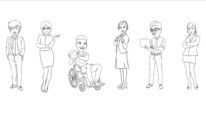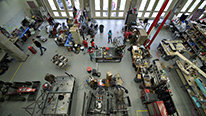Rehabilitation Engineering at Cleveland State University
NSF Awards: 1659559
2020 (see original presentation & discussion)
Grades 6-8, Grades 9-12, Undergraduate, Informal / multi-age
In an effort to inspire the next generation of engineers we highlight work that engineers do "Beyond the Numbers". This video captures the work of a diverse group of students who participated in our summer undergraduate research experience on rehabilitation engineering called RE@CSU or Rehabilitation Engineering at Cleveland State University. We hope to dispel the myths that engineers lack empathy, only care about math and science, and work in isolation from the world. Instead we want to introduce middle and high school students to the idea that engineering is a career path for those who really want to have their work touch people's lives in a profound way.
Related Content for Engineering: Beyond the Numbers
-
 2021Center for Neurotechnology: Creating Access for All
2021Center for Neurotechnology: Creating Access for All
Sheryl Burgstahler
-
 2020#EngineersShowUp to Disrupt Systems of Oppression
2020#EngineersShowUp to Disrupt Systems of Oppression
Donna Riley
-
 2018Engineers Leading Inclusive Dept. Culture Change: TECAID
2018Engineers Leading Inclusive Dept. Culture Change: TECAID
Gretal Leibnitz
-
 2021Tomorrow's Community Innovators
2021Tomorrow's Community Innovators
Virginia Davis
-
 2021ANSEP Innovation and Success during COVID
2021ANSEP Innovation and Success during COVID
Herb Schroeder
-
 2019U-M BME Instructional Incubator and BME-in-Practice Sequence
2019U-M BME Instructional Incubator and BME-in-Practice Sequence
Aileen Huang-Saad
-
 2018IE Capstone Projects to Benefit Adults with Disabilities
2018IE Capstone Projects to Benefit Adults with Disabilities
Mayra Mendez-Pinero
-
 2019Towards Increasing Native American Engineering Faculty
2019Towards Increasing Native American Engineering Faculty
Sherri Turner

Eric Schearer
Director
Welcome to our presentation. We want the experiences of our summer undergraduate researchers -- who work on engineering projects for and with people with disabilities -- to inspire younger students to consider engineering. Specifically, we want young students to think of engineering as a profession that has personal contact with people’s lives. Students who are interested in science and math and really want personal contact with the people they serve might think of nursing, physical therapy, or psychology as professions to explore these interests. We want them to think of engineering in the same way. In a sense we want to “humanize” engineering. This is the inspiration for this “Beyond the Numbers” presentation.
We are looking for the following input:
1) What are ways can we distribute this video and similar videos we produce so that more young people see them?
2) With the goal to include more “people-centered” people in the engineering profession, how can we use our summer undergraduate research program to reach out to young people like this? Right now we produce videos like the one here and we have a “demonstration day” with a local high school.
Don't forget to join us on twitter and our websites.
@csu_chms
chms.csuohio.edu
engineering.csuohio.edu/recsu
Sonia Ellis
Wonderful work! So true that students often don't see how engineering is relevant to them, or that engineers can have a powerful impact on improving communities and people's lives. The undergraduates in your program are relatable and inspiring.
Becky Mazur
Eric Schearer
Director
Thank you Sonia. It certainly helps to have good students to tell the story.
Becky Mazur
I found this video to be touching, and effective at illustrating the power of engineers to profoundly contribute to improving people's lives. Your question about how to get more young people exposed to this work is an interesting one -- I wonder if your summer undergrads could be tasked with doing some youth outreach (tiktok, instagram, etc.)
Eric Schearer
Director
Great idea Becky. I like that. I always fear that the more outreach we do, the less we do of lab experiences for our students. Your idea solves that problem. Do you have any ideas on how college kids can access a younger audience on social media? Maybe it's just using the right apps as you have suggested here.
Becky Mazur
Well, this is embarrassing to admit, but, inspired by my college-age son, I've been spending a bit of time on tiktok during the pandemic (I am probably the oldest person on the app by several decades...) Many of the videos I see are super clever and creative, and I keep wondering how to use the space to expose a broader audience to STEM. Your summer interns might have ideas about this -- or they may not! (My other, slightly older son has never looked at TikTok and has absolutely no interest.) BUT there may be a marketing or communications department at your university that you could partner with -- maybe one of your summer interns can be from that world, with an interest in using their talents for the public good? (I know from experience that this is way easier said than done, given how siloed we often are in higher ed...)
Alison Heimowitz
School and Teacher Liaison
I love the practical application of engineering to improve people's lives. Have you tried using STEM hubs to get this video out to more high school students? I know high school teachers in Oregon are scrambling to connect students to different career options so you definitely have an audience.
Eric Schearer
Director
Thanks for your comment Alison.
I have not. I have sort of heard of STEM hubs but have not engaged with them. I think we have one in Northeast Ohio.
I also struggle with the message when we make a video. We try to do a new one each year with the goal to reach out to younger students. I fear that the message in the videos me have made is too general. What do you think? Should we be more specific and make a video that has college students describe more explicitly what a rehab engineer does?
Judi Fusco
Senior Researcher Stem Teaching and Learning
Jumping in here... I would think different messages in your videos would be important as different students would have different questions. Have you done any focus groups with the students you're interested in reaching?
Eric Schearer
Director
Focus groups are a great idea. We could certainly do this -- we have a high school and a K-12 school on our campus.
Judi Fusco
Alison Heimowitz
School and Teacher Liaison
Focus groups are a great idea. You might consider drawing in some high school teachers too. They are well versed in career exploration because it is a graduation requirement in many Oregon schools.
Judi Fusco
Judi Fusco
Senior Researcher Stem Teaching and Learning
What a great REU program and video to share about it. The students featured were amazing.
For outreach, instagram, tiktok, -- I'll ask my 3 social media experts (in high school) about where they might look. I'll report back.
Eric Schearer
Director
Thanks Judi.
Judi Fusco
Senior Researcher Stem Teaching and Learning
Snapchat was the new suggestion. :-)
Tsivia Cohen
Great presentation. Love seeing engineering placed in the context of human stories. Understanding the potential of engineering to help people is something we're looking at as well, but with a much younger audience. Inspiring future engineers with a mindset of increasing access is really terrific. Thank you for your important work. Tsivia Cohen, Chicago Children's Museum
Eric Schearer
Director
First off, I love the Chicago Children's Museum. I lived in Chicago for 7 years and my oldest daughter spent lots of time there.
Thanks for your comment. When you watch the video, what age group do you think it appeals to? I'm not sure myself. Maybe this isn't feasible, but what might we do to make a video targeted to the early childhood audience?
Kenne Dibner
Senior Program Officer
Great video - I love seeing young people represented in their fullness in STEM contexts. Very inspiring.
One question I had is about how you are connecting to teachers - it seems to me that much of the work around building a STEM identity comes down to regular reinforcement of students' sense of belonging in a field, and teachers are so central to sending that message. Have you thought about how you might explicitly involve teachers in supporting your students as they develop their STEM identities?
Judi Fusco
Eric Schearer
Director
Thanks Kenne.
For the students in the video, their teachers are the research advisors. Many of the research advisors have regular conversations with students to reinforce students' sense of belonging, but we might include this suggestion in mentor training.
In terms of high school students we might reach, we might think about packaging the videos with guidance to high school teachers when they present the videos to students. This guidance might include your suggestion to reinforce with individual students that they belong in engineering. I think our message is that you don't have to be the very best at math, you can be someone who likes to build stuff that helps people. I like your suggestion to have a teacher make this statement explicitly to students.
Judi Fusco
Christopher Griffin
Great video and amazing work. I think this is such a great way to not only show the diversity of what engineers can do, but like you state, show engineers aren't all about the math and science. It is often hard in class to relate how what they are studying can one day impact lives. In my younger students I often introduce this definition of an engineer, "One who systematically and professionally applies science and mathematics to the efficient utilization of natural resources to produce wealth and meet societal needs. An engineer is most often constrained in his/her work by safety, cost, and practicality." The students often see "wealth" and think money, but I redirect them to think of wealth as meaning many different things to different people, organizations, societies. Sure, we could design a new airfoil shape that reduces drag and saves money and emissions, but we can also develop a new prosthetic or ADL tool that can significantly improve the "wealth" of one's daily life. I'll say you've inspired me to look at other things my STEM-SURE students can be involved in, thank you.
Eric Schearer
Director
Thanks for the comments, Christopher. I think there are many, many young people who really do see an ADL tool as something that produces "wealth" but maybe don't connect that to engineering. Thanks for helping us to change that idea.
Further posting is closed as the event has ended.